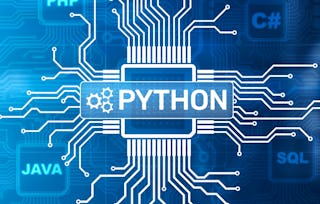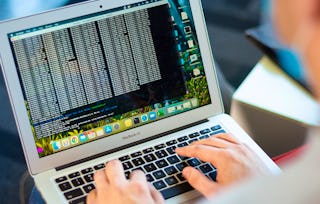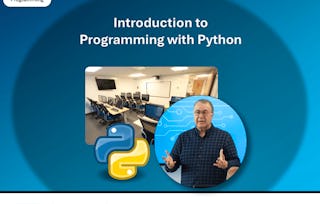In today’s society, uses for new technologies are broadening in scope and revolutionizing the world. Many new technologies automate redundant tasks so people may complete tasks of greater priority. These new automated technologies depend on the constant innovation of software. To develop software that can increase our efficiency and change the world for the better, it is vital to understand how to code using different programming languages. This specialization introduces the basics of the Python programming language and teaches how to implement solutions to real-world problems using Python syntax. Topics in this course range from utilizing integrated development environments (IDEs) to implementing Python syntax in scripts. Some of the position titles that may benefit from this course are computer scientist, computer engineer, software engineer, software developer, software tester, electrical engineer, mechanical engineer, chemical engineer and aerospace engineer.

Introduction to Python

Introduction to Python
This course is part of Python: A Guided Journey from Introduction to Application Specialization

Instructor: Adwith Malpe
5,344 already enrolled
Included with
36 reviews
Recommended experience
What you'll learn
Students will master the basic skills of coding in python and will be able to understand the syntax.
Skills you'll gain
Details to know

Add to your LinkedIn profile
9 assignments
See how employees at top companies are mastering in-demand skills

Build your subject-matter expertise
- Learn new concepts from industry experts
- Gain a foundational understanding of a subject or tool
- Develop job-relevant skills with hands-on projects
- Earn a shareable career certificate

There are 5 modules in this course
In today’s society, uses for new technologies are broadening in scope and revolutionizing the world. Many new technologies automate redundant tasks so people may complete tasks of greater priority. These new automated technologies depend on the constant innovation of software. To develop software that can increase our efficiency and change the world for the better, it is vital to understand how to code using different programming languages. This specialization introduces the basics of the Python programming language and teaches how to implement solutions to real-world problems using Python syntax. Topics in this course range from utilizing integrated development environments (IDEs) to implementing Python syntax in scripts. Some of the position titles that may benefit from this course are computer scientist, computer engineer, software engineer, software developer, software tester, electrical engineer, mechanical engineer, chemical engineer and aerospace engineer. You do not need programming or computer science experience to learn the material in this course. This course is open to anyone who is interested in learning how to code and write programs in Python. We are very excited that you will be learning with us and hope you enjoy the course!
What's included
1 video1 reading
This course covers the basics of Python and provides you with knowledge to solve real-world problems using Python.
What's included
6 videos6 readings1 assignment2 discussion prompts
In this module, you will learn what input and output data are, how to handle input and output data, how to work with data of different data types, how to process data using arithmetic operators, and how to display output.
What's included
7 videos12 readings3 assignments1 peer review1 discussion prompt
In this module, you will learn how to manipulate control structures to make decisions when handling data and will learn how to use loops to eliminate the need to perform redundant tasks.
What's included
7 videos8 readings3 assignments
In this module, you will learn how to create functions to make code more modular and to complete tasks used many times in programs.
What's included
4 videos9 readings2 assignments1 peer review
Earn a career certificate
Add this credential to your LinkedIn profile, resume, or CV. Share it on social media and in your performance review.
Instructor

Offered by
Explore more from Software Development
 Status: Preview
Status: PreviewUniversity of Leeds
 Status: Free Trial
Status: Free TrialArizona State University
 Status: Preview
Status: PreviewIllinois Tech
 Status: Free Trial
Status: Free TrialLogical Operations
Why people choose Coursera for their career

Felipe M.

Jennifer J.

Larry W.

Chaitanya A.

Open new doors with Coursera Plus
Unlimited access to 10,000+ world-class courses, hands-on projects, and job-ready certificate programs - all included in your subscription
Advance your career with an online degree
Earn a degree from world-class universities - 100% online
Join over 3,400 global companies that choose Coursera for Business
Upskill your employees to excel in the digital economy
Frequently asked questions
To access the course materials, assignments and to earn a Certificate, you will need to purchase the Certificate experience when you enroll in a course. You can try a Free Trial instead, or apply for Financial Aid. The course may offer 'Full Course, No Certificate' instead. This option lets you see all course materials, submit required assessments, and get a final grade. This also means that you will not be able to purchase a Certificate experience.
When you enroll in the course, you get access to all of the courses in the Specialization, and you earn a certificate when you complete the work. Your electronic Certificate will be added to your Accomplishments page - from there, you can print your Certificate or add it to your LinkedIn profile.
Yes. In select learning programs, you can apply for financial aid or a scholarship if you can’t afford the enrollment fee. If fin aid or scholarship is available for your learning program selection, you’ll find a link to apply on the description page.
More questions
Financial aid available,

